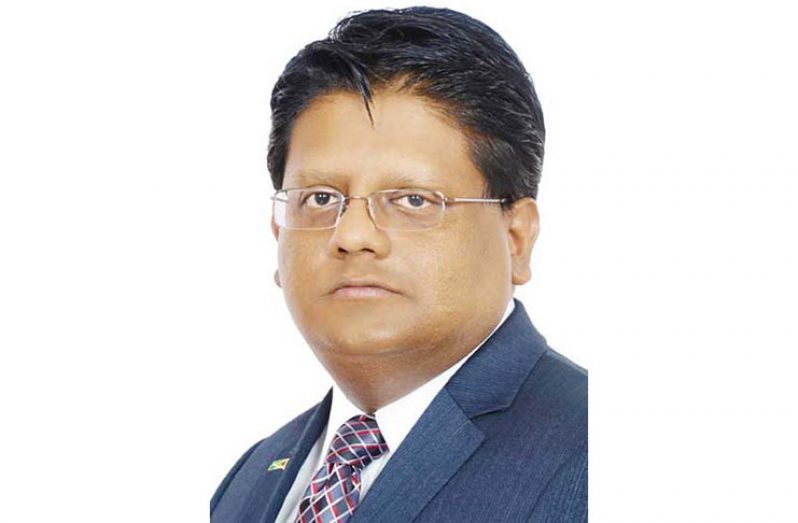— authorities intensifying efforts to develop local labour force
HAVING an educated and skilled workforce is essential to the advancement of any country, so the Government, being cognisant of this, plans to invest heavily in education and training. The objective here is to ensure that every Guyanese of working age is equipped with the skills necessary for employment in the sector of their choice. A business-friendly climate, supplemented by the anticipated economic ascension, has served as a magnet for investors, both foreign and local. And, while this augurs well for the nation, it has exposed a deficiency in the labour force, which is regarded as being woefully underprepared to service the potential economic activities, especially those related to the oil-and-gas sector. Guyana, with a population of just over 750,000, has focused mainly on primary production in traditional sectors over the years, but this new attention has created unprecedented opportunities for the nation and its people.
“An educated and highly-skilled workforce is critical to our competitiveness as a destination for investment, but also critical is ensuring that the Guyanese people are able to get jobs,” said Senior Minister with responsibility for Finance, Dr. Ashni Singh. “We want to create an environment where every single Guyanese who is of working age is equipped with skills that make them employable. Every Guyanese of employment age should have access to opportunities to acquire skills that will make them employable; and we are planning to do this at every level,” he told the Guyana Chronicle during an exclusive interview on Sunday. Outgoing Canadian High Commissioner, Lilian Chatterjee is quoted as saying that Guyana lacks a skilled and sizeable labour force to service the “explosive” oil-linked growth that is coming.
“You are already witnessing an influx of global political leaders and investors who want to do business in Guyana. Get ready; this is just the beginning! But, that workforce does not exist right now in Guyana; you do not have the population yet to be the engine of your rapid growth,” the Canadian diplomat said.
In the absence of the requisite skillset, she said that Guyana will have to accept a foreign labour force, while it works on developing local capacity to absorb the unprecedented growth the country is expected to undergo.
SUITABLY SKILLED WORKFORCE
But although the need for foreign support is undeniable, the government has maintained that it is essential for Guyana to have a suitably skilled workforce in order to provide critical human resources to the budding sectors. “Having an educated and skilled workforce is a critical aspect of a country’s competitiveness as a business environment. Companies want to know they will have access to educated and skilled people; it makes it easier for companies to do business,” D.r Singh said.
“So, a lot of emphasis will be placed on education; and not just on increasing access, but also the quality at all levels. It continues to be a priority to ensure that every Guyanese has access to education at whichever level you are,” he added. The government has already made progress in terms of improving access at the primary and secondary levels, so, more emphasis will be placed on providing specialised training. Chairman of the Council for Technical and Vocational Education and Training (TVET) and the Board of Industrial Training (BIT), Mr. Clinton Williams believes that there must be investments in, and the utilisation of, more technical institutes.
DEVELOPMENT OF CAPACITY
“We need to ensure that we develop a capacity to generate the wide range of skills that are needed on a continuous basis. This means that we must have the physical capacity, and the human resources to produce these skillsets, which must be certified by accredited international institutions,” Williams said.
“This can best be realised via an accelerated training of trainers programme, utilising all available technical and vocational institutions and outsourcing of training resources and personnel,” he told the Guyana Chronicle in an invited comment last Wednesday.
Vocational Technical Education (VTE) is a type of education that prepares people to work in various jobs, such as trade, craft or technician. Vocational technical education is sometimes referred to as career education or technical education. Some of the main occupational skills required in the oil and gas sector include welding in different positions, types and under water; under water escape; and environmental and occupational safety and health. Guyanese-owned Oilfield Services Company, TOTALTEC, has already announced that it will be injecting US$2.4 million (over G$516 million) into its International Petroleum and Maritime Academy (IPMA) to improve its capacity, amidst Guyana’s growing oil-and-gas sector. The plan is to invest US$1.8 million into Helicopter Underwater Escape Training (HUET) and other offshore-related training facilities, while an additional US$600,000 will be invested into working capital. It was reported recently, too, that the Caribbean Development Bank (CDB) has approved a US$11 million (approximately $2.3 billion) loan for the development of a Tourism and Hospitality Institute in Guyana.
“We had already at that time identified the need for the development of technical capacity in the tourism and hospitality sector, raising standards, training of personnel, ensuring that people have the skills that are necessary to staff and to manage a modern dynamic and competitive tourism and hospitality sector,” said Dr. Singh.
The government had also made known its intentions to establish a world-class petroleum institute and training centre in Guyana.
The Government, having recognised this shortfall, has started discussions on having a world-class petroleum institute in Guyana, very soon.
“It will not only provide training for Guyanese, but for human resource in the oil and gas sector across the region,” said the President, Dr. Irfaan Ali, in a recent report.
Training would inevitably increase the ability of Guyanese to access jobs. From 2017 to 2019, the unemployment rate in Guyana increased from 12.2 per cent to 13.4 per cent, but the new Government aims to reverse this over the next five years through the creation of 50,000 jobs.




.png)









